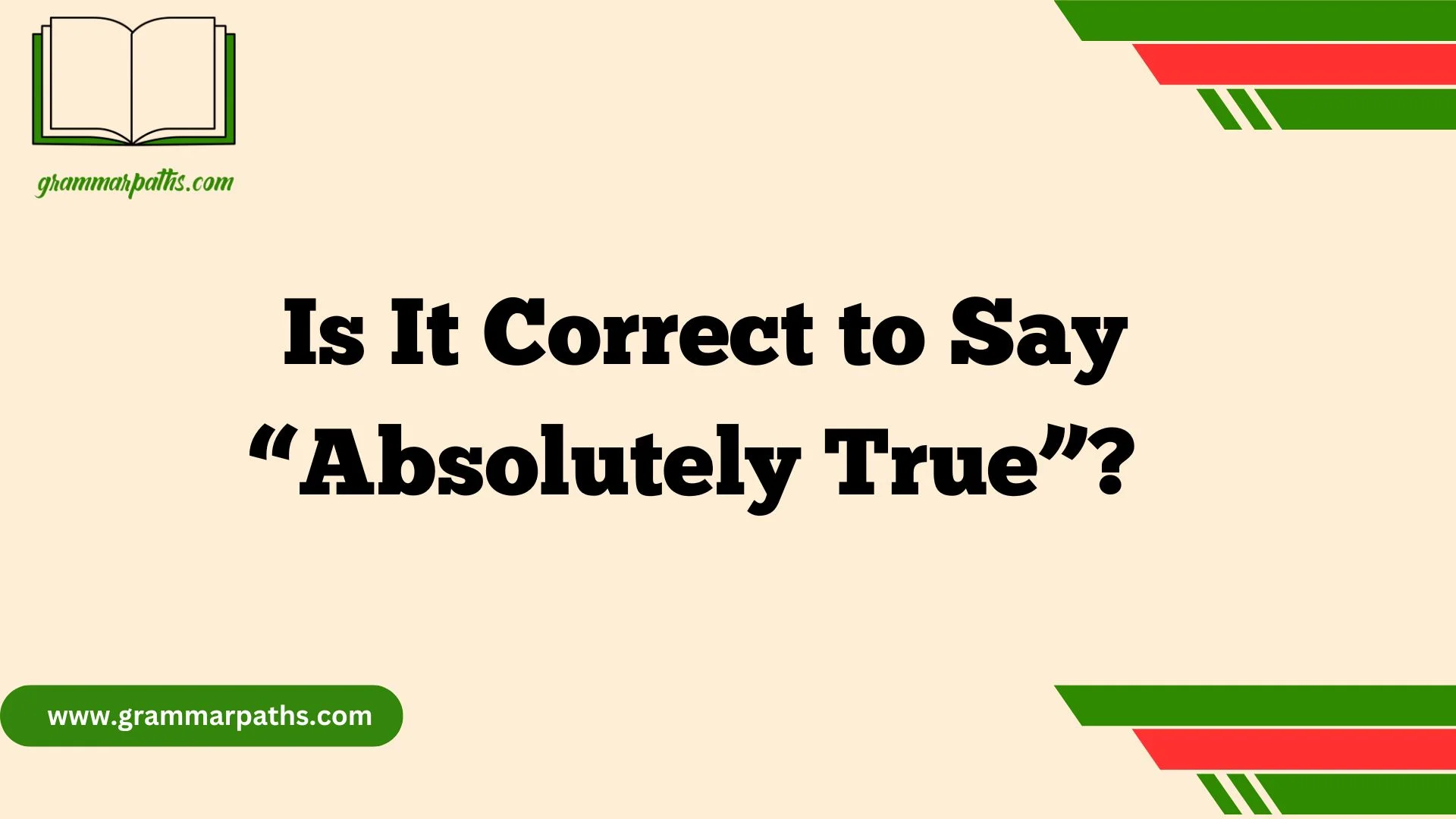I’ve often found myself reaching for the phrase “absolutely true” when trying to highlight the accuracy of a statement. It feels natural, almost instinctive—as if I’m stamping a seal of certainty on what I’m saying. But in my work with language and communication, I’ve learned that what sounds strong in speech doesn’t always hold up under the lens of grammar and usage. English is full of rules—and even more exceptions—which is what makes it such a beautifully evolving system. When we say “absolutely true,” we’re stacking one expression of emphasis onto another. It’s this doubling effect that invites an interesting linguistic inquiry into its validity and correctness.
As a language coach, I’ve come to appreciate the nuance behind word choices. “Absolutely” intensifies the tone, while “true” carries heavy semantic weight, representing factual, genuine, and authentic meaning. Together, they feel reliable, but do they offer clarity or just redundancy? In some contexts, the structure works as a stylistic metaphor, adding flavor and connotation rather than denotation.
From a technical standpoint, the syntax checks out—it’s not incorrect—but its usage leans more toward idiomatic. Still, it’s a confirmed, widely accepted idiom, even if purists argue the precision is debatable. In daily conversation, the tone and intent matter more than textbook correctness, and in that space, the phrase stands as a confidently unquestionable part of modern language.
What Does “Absolutely True” Actually Mean?
At first glance, “absolutely true” looks like a standard combination of an adverb (absolutely) and an adjective (true). Let’s break it down:
- Absolutely means “completely, totally, without exception.”
- True means “in accordance with fact or reality.”
So when someone says “absolutely true,” they are emphasizing that something is 100% factual with no room for doubt or contradiction.
Nuanced Meaning
- Literal Interpretation: Completely accurate or fact-based.
- Connotative Use: A way to stress conviction, sincerity, or emphasis.
💬 Quote: “It’s absolutely true that language evolves faster than we can track it.” — Dr. Elaine Karp, Linguistic Researcher
Is It Grammatically Correct to Say “Absolutely True”?
Yes, it is grammatically correct. English permits adverbs to modify adjectives, especially for emphasis or clarity.
Rule in Grammar:
Adverbs like absolutely, completely, totally, and utterly are often used with ungradable adjectives to reinforce their intensity. “True,” although traditionally seen as a binary adjective, can still be modified contextually.
Examples:
| Phrase | Type | Function |
| Absolutely true | Adverb + Adj | Emphasizes full factuality |
| Completely wrong | Adverb + Adj | Denotes total inaccuracy |
| Entirely possible | Adverb + Adj | Confirms full possibility |
These constructions are supported by grammar sources such as the Cambridge Grammar of the English Language and Merriam-Webster’s Dictionary of English Usage.
Redundancy or Emphasis? Why It’s Not Just a Filler Phrase
Some might argue that saying “absolutely true” is like saying “wet water” or “round circle.” But the reality is more nuanced. English thrives on emphasis and degrees of certainty, and speakers often use these intensifiers to signal emotional investment or reinforce a point.
Why It’s Not Redundant:
- “True” = factually accurate
- “Absolutely true” = factually accurate with full certainty and no exceptions
📌 Linguistic Insight: Redundancy in language often serves a rhetorical function, such as creating emphasis, urgency, or emotional resonance.
How Native Speakers Use “Absolutely True” in Real Life
A quick scan of everyday language—from casual conversations to interviews and online forums—shows that “absolutely true” is widely accepted and frequently used.
Examples from Real Usage:
- “What she said about climate change is absolutely true.”
- “It’s absolutely true that hard work pays off.”
- “Everything in that documentary is absolutely true.”
These examples emphasize certainty, authenticity, and belief.
Spoken vs. Written Usage:
| Context | Usage Frequency | Tone |
| Casual Conversations | High | Emphatic, supportive |
| Professional Emails | Moderate | Depends on tone/formality |
| Academic Papers | Low | Typically replaced with “verifiable,” “evidence-based” |
When Not to Use “Absolutely True”
While the phrase is grammatically valid, context matters. Overuse or poor placement can make it sound unnatural or overly dramatic.
Avoid in:
- Formal academic writing – Use “verifiable,” “substantiated,” or “factually supported.”
- Legal documents – Opt for precision: “accurate,” “factual,” “corroborated.”
- Technical documentation – Replace with data-backed terminology.
Similar Expressions That Add Emphasis (and When to Use Them)
English offers a variety of phrases to express certainty and emphasis. Each carries its own tone and ideal context.
| Phrase | Ideal Use Case | Tone |
| Totally true | Informal conversations | Friendly |
| Unquestionably true | Editorials, opinion columns | Assertive |
| Completely accurate | Reports, professional analysis | Neutral-formal |
| Indisputably factual | Court or evidence-based writing | Strong, formal |
| Undeniably valid | Debates, persuasive writing | Confident |
Tip: Always match the phrase to the tone of your audience and setting.
What Style Guides and Language Experts Say
Major English style guides don’t prohibit “absolutely true,” but they recommend moderation and audience awareness.
Key Insights:
- AP Stylebook: Prioritizes clear and concise writing but does not flag “absolutely true” as incorrect.
- Chicago Manual of Style: Emphasizes stylistic consistency; “absolutely true” is allowed if used for rhetorical impact.
- Grammarly & Oxford English: Mark the phrase as correct but advise against overuse for formal or academic settings.
📚 “The phrase is grammatically fine but best used when you’re making a strong, emotional point.” — Lynne Truss, author of Eats, Shoots & Leaves
Is It Better to Say “Absolutely” Alone?
Sometimes you’ll hear people respond simply with, “Absolutely!” In those cases, the word is functioning as a standalone affirmation.
Differences:
- “Absolutely” = agreement (e.g., “Are you coming tonight?” → “Absolutely!”)
- “Absolutely true” = assertion of factuality or defense of truth
✅ Use “Absolutely!” when agreeing
✅ Use “Absolutely true” when defending a fact
Linguistic Insight: Why English Uses Emphatic Phrasing
English, like many languages, thrives on emphasis. Intensifiers are used to:
- Show certainty
- Add emotional weight
- Signal agreement or support
Common Intensifiers:
- Absolutely
- Definitely
- Certainly
- Undoubtedly
These words help speakers and writers shape their attitude, certainty, and level of conviction.
Examples in Popular Media, News, and Literature
Real-world examples provide context and validation.
News:
- CNN Interview: “The reports about government misconduct are absolutely true.”
- BBC Segment: “It’s absolutely true that inflation has reshaped the economy.”
Literature:
- In The Road by Cormac McCarthy: “What he said was absolutely true, and he knew it.”
Social Media:
- “Everything Taylor Swift said in that speech is absolutely true.” (Twitter/X)
This usage shows how the phrase is employed in a variety of contexts, often for authenticity and impact.
Can You Say “Absolutely False”? Yes—and Here’s Why That Matters
Yes, the phrase “absolutely false” is also grammatically and semantically valid. It’s a mirror structure of “absolutely true.”
| Phrase | Meaning |
| Absolutely true | 100% correct with no exceptions |
| Absolutely false | 100% incorrect with no validity |
This parallelism is common in formal arguments, fact-checking, and debate settings.
Common Mistakes with Emphatic Language
While intensifiers are useful, overusing them or using them improperly can lead to:
- Reduced clarity
- Perceived exaggeration
- Loss of credibility
Mistakes to Avoid:
- Saying “absolutely very true” (redundant intensifiers)
- Using in every sentence (weakens impact)
- Adding it where “true” alone would suffice
The Verdict: Should You Say “Absolutely True”?
Here’s a breakdown of when and why to use this phrase:
| Criteria | Answer |
| Grammatically correct? | ✅ Yes |
| Redundant? | ❌ No, if used with purpose |
| Better alternatives? | ✅ Depending on tone and context |
| Use in formal writing? | ⚠️ Rarely, unless stylistic |
| Common in speech? | ✅ Very |
🎯 Final Tip: Use “absolutely true” when you want to emphasize emotional certainty, not just factual accuracy.
Alternatives to “Absolutely True” (With Contextual Examples)
Here’s a practical table for switching up your language depending on the situation:
| Alternative Phrase | Best Use Case | Tone |
| Unquestionably true | Persuasive essays, debates | Confident |
| 100% true | Casual conversations | Informal |
| Completely accurate | Technical reports, business writing | Neutral |
| Undeniably factual | Legal, policy discussions | Formal |
| Verifiably correct | Scientific or research papers | Academic |
Final Thoughts: Precision vs. Passion in Language
So, is it correct to say “absolutely true”? From a linguistic standpoint, yes—it is both grammatically sound and contextually appropriate. The phrase serves as a powerful way to add emphasis and conviction to a statement, especially in conversations where certainty or clarity is essential. While some may argue that the word “true” doesn’t need intensification, the use of intensifiers like “absolutely” is deeply ingrained in natural English usage and serves a clear communicative purpose.
In English, emphasis through modifiers is not only accepted—it’s expected in many situations where speakers want to show strong agreement or undeniable truth. Language is a living system, and expressions like “absolutely true” reflect how we use it to express certainty, trust, and emotional weight. Rather than being redundant, such phrases demonstrate the flexibility and nuance of English in conveying layered meanings.
Ultimately, using “absolutely true” is a stylistic choice that enhances your tone, clarity, and emphasis. As with many expressions in English, context matters. When used thoughtfully, this phrase is not just correct—it’s absolutely appropriate.
FAQs:
How do you use absolutely true in a sentence?
You can use absolutely true to strongly confirm that something is correct or factual. For example: “What she said about the weather forecast was absolutely true.” It emphasizes total certainty.
How do you express emphasis in English?
English uses adverbs like “really,” “totally,” or “absolutely” to add emphasis. You can also stress words with tone or structure. For example: “I really love this movie” adds emotional weight.
How do you use absolutely in an English sentence?
Absolutely is used to show strong agreement or certainty. Example: “That’s absolutely correct.” It can also stand alone as a response: “Do you agree?” — “Absolutely!”
What is the difference between possibly true and definitely true?
Possibly true means there’s a chance it’s correct but you’re unsure. Definitely true means it’s 100% certain. The first shows doubt, the second shows confidence and proof.
What is another way to say absolutely true?
You can say “undeniably true,” “certainly true,” “definitely true,” or “without a doubt.” These phrases offer strong affirmation, just like absolutely true.
What is a good sentence for true?
Here’s a solid example: “It’s true that kindness can change someone’s entire day.” The word true confirms that the statement is factual or widely accepted.

Mia Rose is the passionate writer and founder of GrammarPaths.com, a resource dedicated to helping learners master English grammar, idioms, and writing skills with ease. With a deep love for language and years of experience in teaching and content creation, Mia simplifies complex grammar rules into clear, practical guides that readers can instantly apply.












